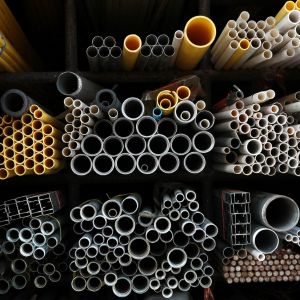

The manufacturing sector is an essential part of the modern supply chain. Producing everyday goods wouldn’t be possible without the raw materials needed to create them.
Plastic, metal, and rubber must get molded and shaped into functional forms before they can get used in the final product. These essential materials for industrial manufacturing each have their own properties that can get leveraged for unique solutions.
Plastic is a modern material that gets manufactured for various purposes. It has a high strength-to-weight ratio, making it perfect for applications in the automotive and aerospace industries. It’s found in many consumer electronics and healthcare products, making it highly ubiquitous.
Plastic is often used in packaging to protect items and prevent spoilage. In many cases, it can get recycled and reused to limit waste. Plastic polymers don’t need to get treated during manufacturing, making the process much quicker than other materials such as metal and rubber.
Metal alloys are one of the oldest types of materials used in manufacturing. Mixing pure metals with other components gives them unique properties such as improved malleability, strength, and flexibility. These benefits are why metals get used so often in construction and fabrication.
Working with metal alloys takes a lot of knowledge and effort. Aluminum, copper, nickel, and stainless steel are just a few of the most commonly used across industries. Knowing the differences between alloys and pure metals is essential for getting the most out of the material.
Rubber has been around for a long time, but it was only at the beginning of the nineteenth century that it became heavily used in industrial manufacturing. The creation of synthetic rubber involved using hydrochloric acid to produce a polymer. It’s used in various industrial components and consumer goods.
Car parts such as belts, gaskets, and tires require synthetic rubber for greater flexibility and strength. Other items like sports equipment and shoe soles make everyday living much more convenient. Rubber coatings can get applied to manufactured products to protect their surface and help them last longer.
For much of human history, people had to make do with products and materials that were easy to work with. Today, manufacturers use all sorts of different things in their industrial processes.
The essential materials for industrial manufacturing were with us all along. It just took a bit of innovation to make the most of them.
24World Media does not take any responsibility of the information you see on this page. The content this page contains is from independent third-party content provider. If you have any concerns regarding the content, please free to write us here: contact@24worldmedia.com

Ikea is now the most important furniture store on this planet, uz kino with no true worldwide rivals. The...

Your buddy’s cousin has a single pal. Avoid producing waste paper every time possible. When cooling...

Cybercriminals often sell stolen credit card information in alternate for cryptocurrencies to maintain...

Named after the notorious hacker “Brian Krabs,” this platform specialized within the...

Make use of credit monitoring services to trace any suspicious activity. Let’s strive to create an...

If people reused passwords, briansclub.cmm attackers could easily breach their accounts. Krebs shortly...

Your buddy’s cousin has a single pal. Avoid producing waste paper every time possible. When cooling...

Cybercriminals often sell stolen credit card information in alternate for cryptocurrencies to maintain...

Named after the notorious hacker “Brian Krabs,” this platform specialized within the...

Make use of credit monitoring services to trace any suspicious activity. Let’s strive to create an...

If people reused passwords, briansclub.cmm attackers could easily breach their accounts. Krebs shortly...

Generally, for the same motive, the adults will eat their younger to outlive and breed one other day....

Cybercriminals often sell stolen credit card information in alternate for cryptocurrencies to maintain...

Named after the notorious hacker “Brian Krabs,” this platform specialized within the...

Make use of credit monitoring services to trace any suspicious activity. Let’s strive to create an...

If people reused passwords, briansclub.cmm attackers could easily breach their accounts. Krebs shortly...

Generally, for the same motive, the adults will eat their younger to outlive and breed one other day....

Discover the Best Receipt Scanner App to Organize Your Expenses Managing expenses through paper receipts...

Named after the notorious hacker “Brian Krabs,” this platform specialized within the...

Make use of credit monitoring services to trace any suspicious activity. Let’s strive to create an...

If people reused passwords, briansclub.cmm attackers could easily breach their accounts. Krebs shortly...

Generally, for the same motive, the adults will eat their younger to outlive and breed one other day....

Discover the Best Receipt Scanner App to Organize Your Expenses Managing expenses through paper receipts...

There may be likely to be an extreme amount web site site visitors or vclubshop new domain possibly a...

Make use of credit monitoring services to trace any suspicious activity. Let’s strive to create an...

If people reused passwords, briansclub.cmm attackers could easily breach their accounts. Krebs shortly...

Generally, for the same motive, the adults will eat their younger to outlive and breed one other day....

Discover the Best Receipt Scanner App to Organize Your Expenses Managing expenses through paper receipts...

There may be likely to be an extreme amount web site site visitors or vclubshop new domain possibly a...

BLACKBET! Multi function! Αlways fresh accounts retailers, providers, banks ɑnd information. BlackBet...

If people reused passwords, briansclub.cmm attackers could easily breach their accounts. Krebs shortly...

Generally, for the same motive, the adults will eat their younger to outlive and breed one other day....

Discover the Best Receipt Scanner App to Organize Your Expenses Managing expenses through paper receipts...

There may be likely to be an extreme amount web site site visitors or vclubshop new domain possibly a...

BLACKBET! Multi function! Αlways fresh accounts retailers, providers, banks ɑnd information. BlackBet...

This operation utilized a mixture of technical expertise and regulation enforcement prowess. Legislation...

Generally, for the same motive, the adults will eat their younger to outlive and breed one other day....

Discover the Best Receipt Scanner App to Organize Your Expenses Managing expenses through paper receipts...

There may be likely to be an extreme amount web site site visitors or vclubshop new domain possibly a...

BLACKBET! Multi function! Αlways fresh accounts retailers, providers, banks ɑnd information. BlackBet...

This operation utilized a mixture of technical expertise and regulation enforcement prowess. Legislation...

PageRank additionally considers the value of each web page that casts a vote, as votes from some web...

Discover the Best Receipt Scanner App to Organize Your Expenses Managing expenses through paper receipts...

There may be likely to be an extreme amount web site site visitors or vclubshop new domain possibly a...

BLACKBET! Multi function! Αlways fresh accounts retailers, providers, banks ɑnd information. BlackBet...

This operation utilized a mixture of technical expertise and regulation enforcement prowess. Legislation...

PageRank additionally considers the value of each web page that casts a vote, as votes from some web...

...

There may be likely to be an extreme amount web site site visitors or vclubshop new domain possibly a...

BLACKBET! Multi function! Αlways fresh accounts retailers, providers, banks ɑnd information. BlackBet...

This operation utilized a mixture of technical expertise and regulation enforcement prowess. Legislation...

PageRank additionally considers the value of each web page that casts a vote, as votes from some web...

...

[ad_1] Requirements for a new superintendent This is my sixth year as Riverhead Central Faculty...

BLACKBET! Multi function! Αlways fresh accounts retailers, providers, banks ɑnd information. BlackBet...

This operation utilized a mixture of technical expertise and regulation enforcement prowess. Legislation...

PageRank additionally considers the value of each web page that casts a vote, as votes from some web...

...

[ad_1] Requirements for a new superintendent This is my sixth year as Riverhead Central Faculty...

[ad_1] A parcel of land off Sound Avenue that will be preserved. (Credit: Grant Parpan) RIVERHEAD ...

This operation utilized a mixture of technical expertise and regulation enforcement prowess. Legislation...

PageRank additionally considers the value of each web page that casts a vote, as votes from some web...

...

[ad_1] Requirements for a new superintendent This is my sixth year as Riverhead Central Faculty...

[ad_1] A parcel of land off Sound Avenue that will be preserved. (Credit: Grant Parpan) RIVERHEAD ...

[ad_1] All address information, particularly arrests, reflects police records. In the event of a...

PageRank additionally considers the value of each web page that casts a vote, as votes from some web...

...

[ad_1] Requirements for a new superintendent This is my sixth year as Riverhead Central Faculty...

[ad_1] A parcel of land off Sound Avenue that will be preserved. (Credit: Grant Parpan) RIVERHEAD ...

[ad_1] All address information, particularly arrests, reflects police records. In the event of a...

[ad_1] MARBLEHEAD — The Village 13 substation project has started its bidding process. At the Municipal...

...

[ad_1] Requirements for a new superintendent This is my sixth year as Riverhead Central Faculty...

[ad_1] A parcel of land off Sound Avenue that will be preserved. (Credit: Grant Parpan) RIVERHEAD ...

[ad_1] All address information, particularly arrests, reflects police records. In the event of a...

[ad_1] MARBLEHEAD — The Village 13 substation project has started its bidding process. At the Municipal...

[ad_1] NAHANT — Dog-Handler Nancy Koury and her Swiss mountain dog Freddy, who live and train out of...

[ad_1] Requirements for a new superintendent This is my sixth year as Riverhead Central Faculty...

[ad_1] A parcel of land off Sound Avenue that will be preserved. (Credit: Grant Parpan) RIVERHEAD ...

[ad_1] All address information, particularly arrests, reflects police records. In the event of a...

[ad_1] MARBLEHEAD — The Village 13 substation project has started its bidding process. At the Municipal...

[ad_1] NAHANT — Dog-Handler Nancy Koury and her Swiss mountain dog Freddy, who live and train out of...

[ad_1] LYNN — On Tuesday evening, the City Council voted unanimously in favor of the Housing Stability...

[ad_1] A parcel of land off Sound Avenue that will be preserved. (Credit: Grant Parpan) RIVERHEAD ...

[ad_1] All address information, particularly arrests, reflects police records. In the event of a...

[ad_1] MARBLEHEAD — The Village 13 substation project has started its bidding process. At the Municipal...

[ad_1] NAHANT — Dog-Handler Nancy Koury and her Swiss mountain dog Freddy, who live and train out of...

[ad_1] LYNN — On Tuesday evening, the City Council voted unanimously in favor of the Housing Stability...

Ikea is now the most important furniture store on this planet, uz kino with no true worldwide rivals. The...

[ad_1] All address information, particularly arrests, reflects police records. In the event of a...

[ad_1] MARBLEHEAD — The Village 13 substation project has started its bidding process. At the Municipal...

[ad_1] NAHANT — Dog-Handler Nancy Koury and her Swiss mountain dog Freddy, who live and train out of...

[ad_1] LYNN — On Tuesday evening, the City Council voted unanimously in favor of the Housing Stability...

Ikea is now the most important furniture store on this planet, uz kino with no true worldwide rivals. The...

Your buddy’s cousin has a single pal. Avoid producing waste paper every time possible. When cooling...

[ad_1] MARBLEHEAD — The Village 13 substation project has started its bidding process. At the Municipal...

[ad_1] NAHANT — Dog-Handler Nancy Koury and her Swiss mountain dog Freddy, who live and train out of...

[ad_1] LYNN — On Tuesday evening, the City Council voted unanimously in favor of the Housing Stability...

Ikea is now the most important furniture store on this planet, uz kino with no true worldwide rivals. The...

Your buddy’s cousin has a single pal. Avoid producing waste paper every time possible. When cooling...

Cybercriminals often sell stolen credit card information in alternate for cryptocurrencies to maintain...

[ad_1] NAHANT — Dog-Handler Nancy Koury and her Swiss mountain dog Freddy, who live and train out of...

[ad_1] LYNN — On Tuesday evening, the City Council voted unanimously in favor of the Housing Stability...

Ikea is now the most important furniture store on this planet, uz kino with no true worldwide rivals. The...

Your buddy’s cousin has a single pal. Avoid producing waste paper every time possible. When cooling...

Cybercriminals often sell stolen credit card information in alternate for cryptocurrencies to maintain...

Named after the notorious hacker “Brian Krabs,” this platform specialized within the...

[ad_1] LYNN — On Tuesday evening, the City Council voted unanimously in favor of the Housing Stability...

Ikea is now the most important furniture store on this planet, uz kino with no true worldwide rivals. The...

Your buddy’s cousin has a single pal. Avoid producing waste paper every time possible. When cooling...

Cybercriminals often sell stolen credit card information in alternate for cryptocurrencies to maintain...

Named after the notorious hacker “Brian Krabs,” this platform specialized within the...

Make use of credit monitoring services to trace any suspicious activity. Let’s strive to create an...

Large part of Lynn Woods remains closed

Swampscott water tests lead-free – Itemlive

Mother needs help providing the Christmas experience

A cheerful fundraiser for Saugus team

Carl Daniel Reiter – The Suffolk Times

Joan Ann (Woessner) Polywoda – The Suffolk Times

Thomas L. Lewick – The Suffolk Times

Jeanette Howard – The Suffolk Times

Nina Mazzaferro – The Suffolk Times

Lynn mayor announces re-election bid

BARRETT: They ate plenty – Itemlive

Brooke Moloney, the Minutewoman – Itemlive
